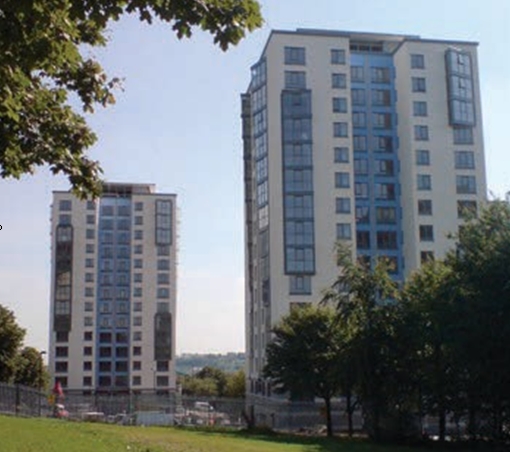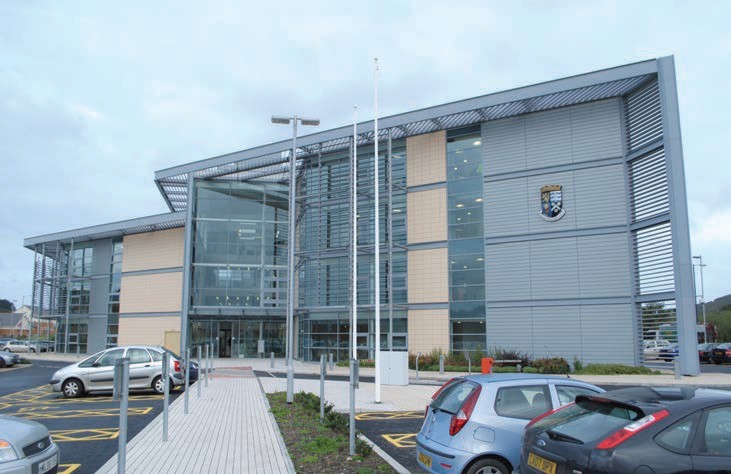Initial commissioning case studies
[edit] Introduction
Initial commissioning, static commissioning, or pre-completion commissioning, covers the basic commissioning required to satisfy a building's specification.
Essentially, initial commissioning is just proof of capability, such as the ability of a mechanical ventilation system to deliver the required air volumes, or the heating system to provide the required heat output. Tests will include health and safety checks, and controls systems will be checked. Set-points will be fixed and recorded in the documentation.
Full-load commissioning may not be possible prior to occupation. Loads may not be available because of the time of year, or phased occupation may mean internal heat gains are absent. Ventilation systems working at full capacity might reveal noise or vibration problems, or the terminal units might create unpleasant draughts. As such problems may only emerge later, it raises the logic of having a graduated handover. See: Soft Landings for more information.
[edit] Case studies: Carbon Trust's Low Carbon Building's Programme
All the buildings included in the Carbon Trust's Low Carbon Building's Programme (LCBP) were categorised as low-carbon buildings, in that they either had on-site renewable energy generation or some other technology that reduced carbon dioxide emissions. These technologies tended to be commissioned by a specialist - in most cases either the installer or manufacturer. Many manufacturers provided a commissioning checklist for their product. Once completed, the checklists were retained in the handover documentation.
While this was fine at the point of commissioning, problems tended to surface later. For example, some suppliers of low carbon technologies are based in continental Europe, which affected the speed of response to calls for advice, information or maintenance. Downtime suffered as a result. Standby boilers installed as back-up to biomass boilers often ran more often than was intended.
Some overseas firms employ local representatives to carry out commissioning. For example, while the biomass boiler serving the Riverside Dene estate was sourced from the Swiss company Schmid, all commissioning was carried out by Imperative Energy, Schmid's UK partners. By contrast, a ground-source heat pump at Edge Hill University was commissioned by the German supplier, which visited the site three times in order to ensure the installation was correctly set up.
Above Two refurbished tower blocks at Riverside Dene, a retrofitted combined heat and power community heating scheme studied by the Carbon Trust.
Additional buildings are being added to the community heating scheme well after the initial commissioning activities have been completed. Instead of setting a strict commissioning schedule, the system is continuously monitored by Vital Energy, which is operating the system. Vital Energy has an experienced engineer who can adjust the system as required. This is essential in a residential community heating scheme, where patterns of occupation may vary.
Remote diagnostic/monitoring systems are increasingly common for technologies such as CHP plant and biomass boilers. Where available, they should be identified and included in the commissioning programme.
Buildings systems may need continual fine-tuning during the first year as loads change. This fine tuning is much more effective when members of the project team are still engaged.
For its Canolfan Rheidol headquarters building near Aberystwyth, Ceredigion County Council had a knowledgeable internal facilities team who could understand the technologies. Similarly, at Pembrokeshire College the requirement for training was put into the contract, with the contractor required to submit a detailed programme of training to the client. The training was given to key personnel by the main contractor and specialist installers over two days, with sessions on the biomass boiler and BMS.
Training has to be given to the personnel who are actually going to operate the building. It's even better if the facilities team can be involved during the construction so they are fully up to speed at the point of handover.
Above: Canolfan Rheidol, the headquarters for Ceredigion County Council. The building is on a biomass district heating scheme. Initial problems with the biomass system saw heating defaulting to the back-up gas boilers.
This article originally appeared in Delta T Magazine May 2011, written by BRIA’s James Parker, where additional copyrighted images are included. It was posted here by --BSRIA 08:31, 26 November 2014 (UTC).
[edit] Related articles on Designing Buildings Wiki
- At your services - What to expect during commissioning.
- Client commissioning.
- Commissioning.
- Commissioning documents.
- Commissioning notice.
- Commissioning plan.
- Commissioning planning.
- Commissioning v testing.
- Corrosion in heating and cooling systems.
- Local needs analysis.
- Migration strategy.
- Commissioning planning.
- Practical completion.
- Seasonal and continuous commissioning.
- Soft landings.
- Specialist commissioning manager.
Featured articles and news
A case study and a warning to would-be developers
Creating four dwellings for people to come home to... after half a century of doing this job, why, oh why, is it so difficult?
Reform of the fire engineering profession
Fire Engineers Advisory Panel: Authoritative Statement, reactions and next steps.
Restoration and renewal of the Palace of Westminster
A complex project of cultural significance from full decant to EMI, opportunities and a potential a way forward.
Apprenticeships and the responsibility we share
Perspectives from the CIOB President as National Apprentice Week comes to a close.
The first line of defence against rain, wind and snow.
Building Safety recap January, 2026
What we missed at the end of last year, and at the start of this...
National Apprenticeship Week 2026, 9-15 Feb
Shining a light on the positive impacts for businesses, their apprentices and the wider economy alike.
Applications and benefits of acoustic flooring
From commercial to retail.
From solid to sprung and ribbed to raised.
Strengthening industry collaboration in Hong Kong
Hong Kong Institute of Construction and The Chartered Institute of Building sign Memorandum of Understanding.
A detailed description from the experts at Cornish Lime.
IHBC planning for growth with corporate plan development
Grow with the Institute by volunteering and CP25 consultation.
Connecting ambition and action for designers and specifiers.
Electrical skills gap deepens as apprenticeship starts fall despite surging demand says ECA.
Built environment bodies deepen joint action on EDI
B.E.Inclusive initiative agree next phase of joint equity, diversity and inclusion (EDI) action plan.
Recognising culture as key to sustainable economic growth
Creative UK Provocation paper: Culture as Growth Infrastructure.
Futurebuild and UK Construction Week London Unite
Creating the UK’s Built Environment Super Event and over 25 other key partnerships.
Welsh and Scottish 2026 elections
Manifestos for the built environment for upcoming same May day elections.
Advancing BIM education with a competency framework
“We don’t need people who can just draw in 3D. We need people who can think in data.”




























